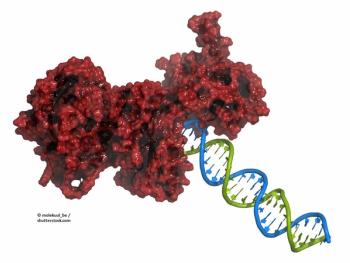
New research examines the mechanisms underlying why most patients with high-grade serous ovarian cancer develop resistance to PARP inhibitors.

Your AI-Trained Oncology Knowledge Connection!


New research examines the mechanisms underlying why most patients with high-grade serous ovarian cancer develop resistance to PARP inhibitors.

Jeff Kranau’s story is a moving one but, during this economic downturn, not necessarily a unique one. The former South Florida salesman was successfully treated for squamous cell carcinoma of the larynx in 2009 and declared cancerfree. But what should have been a reason for celebration has, over time, sent Mr. Kranau’s life into a tailspin.

C. Kent Osborne, MD, codirector of SABCS 2010, spoke with Oncology NEWS International about what to watch for at this year’s meeting. Dr. Osborne highlights key studies in adjuvant therapy and aromatase inhibitor therapy and discusses some of the future challenges that the breast cancer community faces.

For women with triple-negative breast cancer, BRCA mutations can be a boon: These patients have a significantly lower risk of relapse than their counterparts who do not carry BRCA mutations, according to a study out of Houston’s M.D. Anderson Cancer Center. SABCS 2010 will feature an education session on the clinical utility of genetic testing for inherited predisposition to breast cancer.

Take-home message from the current data is the importance of exposing patients to all potentially active agents.

Imatinib (Gleevec), the first-line standard of care in chronic myeloid leukemia, will become a generic drug in 2015, so the race is on to find a second generation of tyrosine kinase inhibitors (TKIs) that can do the job just as well.

Patient preference needs to be weighed against overall societal benefits.

Data from French trial should inform treatment decisions in the majority of lung cancer patients aged 70 and up.

Results of a long-term intergroup study on the effect of selenium in early non-small-cell lung cancer highlight the differences between smokers and nonsmokers, and support the thesis that “good” supplements may be harmful in the presence of carcinogens.

If approved, oncologists will have a new therapeutic option with proven benefits, acceptable toxicity, said EMBRACE trial leader.

Lung cancer is not a discriminate disease, but the disease burden is especially high on African Americans in the U.S. The statistics are stark: African-American men are 37% more likely to develop lung cancer than white men and are 22% more likely to die of it. In addition, only 12% of African Americans live longer than five years after a diagnosis of lung cancer, compared with 16% of whites, according to a recent report by the American Lung Association.

Survey results indicate patient access schemes in the UK and the U.S. need refinement.

Published: June 21st 2010 | Updated:

Published: August 10th 2010 | Updated:

Published: October 20th 2010 | Updated:

Published: December 5th 2010 | Updated:

Published: December 3rd 2010 | Updated:

Published: December 30th 2010 | Updated: